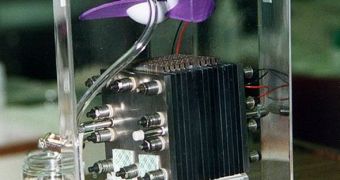Researchers at the Massachusetts Institute of Technology (MIT), in Cambridge, are currently studying a new class of materials, which they say could provide vastly improved hydrogen-storing capabilities for the next generation of fuel cells.
These energy-storing devices are being used to replace gasoline and diesel in standard vehicles, as well as for a host of other applications. Still, progress in their implementation at a large scale have largely failed due to the fact that they cannot hold too much hydrogen, or release it quickly enough.
Researchers around the world are working together on fixing this issue, and the MIT team has been a part of the effort for many years. The goal experts here have is to find robust, cheap and lightweight solutions for storing the valuable gas.
Together with colleagues from a number of other research institutions, the investigators were recently able to incorporate high-tech, platinum-based catalysts into activated carbon, producing a material which can hold a lot of hydrogen gas.
Inside, the small atoms bind directly to the surface of the carbon particles, and only let go when they need to be released. What is remarkable about this approach is the fact that it does not require the gas to be liquefied or otherwise processed.
It also does away with the need to include energy-intensive systems and heavy insulation, like other storage methods do. The latter rely on using liquid hydrogen at temperatures as low as minus 423 degrees Fahrenheit, and under tremendous pressure.
By using activated carbon, it is possible to store hydrogen gas at ambient pressure and room temperature, which is a tremendous step towards lowering the costs associated with fuel cells, as well as increasing their efficiency.
The research team was led by Sow-Hsin Chen, the MIT professor emeritus in the Department of Nuclear Science and Engineering, also the senior author of a new paper detailing the findings. The work will appear in an upcoming issue of the Journal of Physical Chemistry Letters.
Experts from the National Institute of Standards and Technology, the University of Delaware, the Institute of Nuclear Energy Research in Taiwan, the National Tsinghua University in Taiwan and the Pennsylvania State University were involved in this study.

 14 DAY TRIAL //
14 DAY TRIAL //